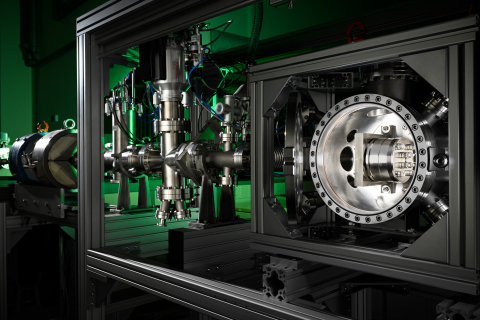Scientists at DIFFER are bringing nuclear power via inherently safe thorium reactors one step closer. With DICE (the DIFFER Irradiation-Corrosion Experiment), they will develop materials resistant to the combination of heat, salt and radiation. On 25 October, DIFFER will officially inaugurate the facility.
In spring 2022 Province of Noord-Brabant announced, as part of the Nuclear Innovation Coalition, to also invest in the development of technology for a thorium reactor, also known as a molten-salt reactor. The big advantage of this type of nuclear fission reactors is that they cannot have a meltdown. They just stop when something is wrong. Moreover, less strong radioactive waste is released.

Unique in Europe
The challenge in molten-salt reactors is the wall. It has to be resistant to heat, radiation and corrosion by salt. At the existing Ion Beam Facility, DIFFER has now created a reservoir with hot molten salt behind the ion beam. That salt flows past the structural materials to be examined.
"After a while, we can see how the material has reacted to the combination of radiation from the ion beam and the flowing salt", explains DIFFER researcher and project leader Beata Tyburska-Pueschel. She continues: "With DICE, we have the first facility in Europe that allows us to simultaneously look at how promising materials react to corrosion by salt and to irradiation."
Passing the test
Materials that best pass the combination of salt and ion radiation can be sent for further research to, for example, the reactor in Petten. There, they can be exposed to the neutrons released in nuclear reactions. Once the most suitable material is found, Dutch start-up Thorizon believes it will be able to deliver a molten-salt reactor as early as 10 years from now.
DICE was developed in a collaboration between DIFFER and the German company Aachen Ion Beam. Dutch start-up Thorizon is the first user of DICE. The DICE project is funded by the Province of Noord-Brabant and by Horizon-Euratom-2021-NRT-01.
Media representatives are welcome to attend the opening on Wednesday 25 October. More information about this (private) event can be found here.
Author: Rianne van Hoek
Go to the News page.